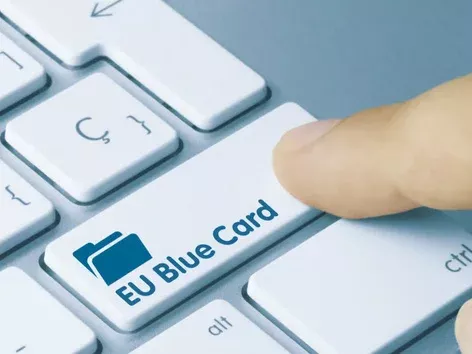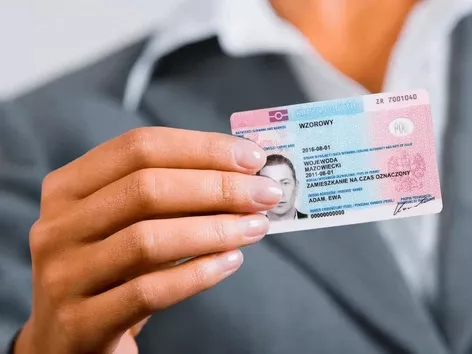Niebieska karta UE w Polsce w 2025 roku: kompletny przewodnik dla Ukraińców
- Czym jest Karta Niebieska UE i czym różni się od standardowego zezwolenia na pobyt?
- Kto może ubiegać się o Kartę Niebieską w Polsce?
- Jakie dokumenty muszę przygotować do Karty Niebieskiej?
- Gdzie i jak złożyć wniosek o Kartę Niebieską?
- Co zrobić, jeśli zmieni się pracodawca lub warunki pracy?
- Co daje Karta Niebieska rodzinie wnioskodawcy?
- Co się zmieniło w 2025 roku: nowe zasady dla Karty Niebieskiej

Jeśli jesteś profesjonalistą z doświadczeniem, wykształceniem i chęcią do pracy legalnie w stabilnym kraju europejskim, Niebieska karta w Polsce w 2025 roku jest jedną z najdogodniejszych opcji. Umożliwia ona nie tylko legalizację twojego statusu na podstawie zatrudnienia, ale także daje dostęp do wielu praw, które wcześniej były dostępne tylko dla obywateli polskich lub mieszkańców UE. Dowiedz się więcej o tym, jak ubiegać się o Niebieską kartę UE w Polsce, kto jest uprawniony i inne ważne szczegóły
W 2025 roku Polska zaktualizowała zasady wydawania Karty Niebieskiej UE, specjalnego rodzaju zezwolenia na pobyt dla wysoko wykwalifikowanych cudzoziemców, którzy chcą pracować w kraju. Dzięki tym zmianom procedura stała się prostsza, a możliwości wzrosły. Jeśli jesteś Ukraińcem i planujesz zbudować karierę w Polsce, powinieneś zwrócić uwagę na tę opcję legalizacji.
W tym artykule zebraliśmy wszystkie istotne wymagania, innowacje i wskazówki, abyś mógł pewnie poruszać się w procesie od przygotowania dokumentów do uzyskania zezwolenia.
Potrzebujesz pomocy w sprawach migracyjnych?
Skontaktuj się z profesjonalnymi prawnikami z Visit Ukraine po poradę!
Czym jest Karta Niebieska UE i czym różni się od standardowego zezwolenia na pobyt?
Karta Niebieska UE to tymczasowe zezwolenie na pobyt wydawane obywatelom krajów trzecich (tj. obywatelom spoza UE) do pracy w wysoko wykwalifikowanym zawodzie. Status ten został po raz pierwszy wprowadzony na poziomie UE w 2009 roku, ale każdy kraj dostosowuje go do swoich warunków prawnych.
W Polsce Karta Niebieska została wprowadzona w 2012 roku, a 1 czerwca 2025 roku weszły w życie ważne aktualizacje mające na celu poprawę dostępu do tego zezwolenia i rozszerzenie praw jego posiadaczy.
Główna różnica między Kartą Niebieską a standardowym zezwoleniem na pobyt to większa stabilność, szybsza integracja, rozszerzone możliwości zatrudnienia, legalizacja rodziny oraz dalsze uzyskanie zezwolenia na pobyt stały lub statusu rezydenta UE.
Kto może ubiegać się o Kartę Niebieską w Polsce?
Główną grupą docelową dla tego zezwolenia są profesjonaliści z wykształceniem wyższym, którzy mają udokumentowane kwalifikacje, doświadczenie zawodowe i podpisali umowę z polskim pracodawcą. Aby ubiegać się o kartę w 2025 roku, osoba musi mieć podpisaną umowę o pracę lub inną umowę cywilnoprawną z firmą w Polsce na co najmniej sześć miesięcy. To nowe zasady, ponieważ wcześniej wymagano umowy na minimum rok.
Kolejnym obowiązkowym wymaganiem jest poziom wynagrodzenia. W 2025 roku nie może być niższe niż 12 272,58 PLN brutto miesięcznie, co stanowi 150% średniego wynagrodzenia w gospodarce kraju za poprzedni rok. Chroni to pracowników przed wykorzystywaniem i jednocześnie gwarantuje, że państwo przyciągnie naprawdę poszukiwanych pracowników.
Doświadczenie zawodowe również odgrywa ważną rolę. Standardowym wymaganiem jest co najmniej pięć lat pracy w danej dziedzinie. Jednak w 2025 roku rząd polski opublikował oddzielną listę zawodów, dla których wystarczające jest trzyletnie doświadczenie zdobyte nie później niż siedem lat przed
złożeniem wniosku.
Na liście znajdują się:
– Programiści, deweloperzy aplikacji mobilnych.
– Analitycy i administratorzy baz danych.
– Specjaliści ds. cyberbezpieczeństwa, inżynierowie sieci.
– Kierownicy działów IT.
– Specjaliści AR/VR i informatyki śledczej.
– Specjaliści IT w medycynie.
– Inne zawody związane z ICT.
Pełną listę zawodów można znaleźć pod tym linkiem.
Jakie dokumenty muszę przygotować do Karty Niebieskiej?
Aby ubiegać się o Kartę Niebieską w Polsce, musisz skompletować pełny zestaw dokumentów. Poniżej znajduje się lista głównych dokumentów wymaganych w 2025 roku:
– Wypełniony wniosek o tymczasowy pobyt. Standardowy formularz, który należy złożyć dla wszystkich rodzajów kart pobytowych. Musi być złożony osobiście i podpisany przez wnioskodawcę.
– Załącznik nr 1. Do wypełnienia przez pracodawcę. Zawiera informacje o firmie, warunkach zatrudnienia, rodzaju umowy, wynagrodzeniu i obowiązkach pracownika.
– Załącznik nr 2. Wypełniony przez wnioskodawcę razem z głównym wnioskiem. Zawiera dane osobowe, informacje o kwalifikacjach, miejsce zamieszkania, plany na pobyt.
– Ważny paszport zagraniczny. Należy dostarczyć kopie wszystkich stron z wizami, pieczątkami i danymi osobowymi. Oryginał musi być przedstawiony przy składaniu.
– Zdjęcia. Cztery kolorowe zdjęcia o wymiarach 3,5×4,5 cm, wykonane nie wcześniej niż sześć miesięcy przed złożeniem, zgodnie z wymaganiami zdjęć wizowych.
– Umowa o pracę lub umowa. Musi być zawarta na okres co najmniej 6 miesięcy. Dokument musi wyraźnie określać wynagrodzenie (nie mniej niż 150% średniej krajowej), zakres obowiązków i harmonogram pracy.
– Dokumenty potwierdzające wykształcenie lub doświadczenie zawodowe. Może to być dyplom wykształcenia wyższego (z poświadczonym tłumaczeniem na język polski) lub zaświadczenie od poprzednich pracodawców potwierdzające doświadczenie w danej dziedzinie (minimum 5 lat lub 3 lata dla zawodów IT).
– Dokumenty potwierdzające pobyt w Polsce. Na przykład umowa najmu, meldunek, pismo potwierdzające od właściciela, itp.
– Ubezpieczenie zdrowotne. Potwierdzenie uczestnictwa w ubezpieczeniu państwowym (ZUS) lub prywatnej polisy zdrowotnej obejmującej wszystkie podstawowe usługi.
– Potwierdzenie opłaty opłat państwowych. Opłata wynosi 440 PLN za wniosek i 50 PLN za kartę plastikową. Paragony należy dołączyć do pakietu wniosków.
– Opinia starosty (jeśli to konieczne). Jeśli wymaga tego prawo, należy również złożyć oświadczenie od burmistrza potwierdzające, że na rynku pracy nie ma kandydatów. Jednak w większości przypadków ten wymóg został zniesiony lub nie dotyczy Karty Niebieskiej.
Proszę pamiętać! Urząd może zażądać dodatkowych dokumentów w zależności od konkretnego przypadku. Zawsze warto mieć przy sobie oryginały wszystkich złożonych dokumentów do weryfikacji.
Przygotowanie dokumentów to najważniejszy etap, a to tutaj najczęściej popełniane są błędy, co może skutkować odrzuceniem wniosku lub opóźnieniem na miesiące. Jeśli nie chcesz podejmować żadnych ryzyk, warto skorzystać z pomocy specjalistów.
Prawnicy Visit Ukraine specjalizują się w procedurach migracyjnych dla Ukraińców w Polsce i znają wszystkie niuanse ubiegania się o Kartę Niebieską według nowych zasad z 2025 roku. Sprawdzą twoje dokumenty, pomogą poprawnie wypełnić wniosek, przygotują go do złożenia w urzędzie i będą ci towarzyszyć, aż otrzymasz swoje zezwolenie.
Gdzie i jak złożyć wniosek o Kartę Niebieską?
Wniosek o Kartę Niebieską należy złożyć osobiście w urzędzie dla cudzoziemców (urząd wojewódzki) w miejscu pracy, zamieszkania lub siedziby pracodawcy. Rejestracja zazwyczaj odbywa się online, przez stronę internetową odpowiedniego województwa.
Po złożeniu wniosku należy przejść procedurę zbierania danych biometrycznych, po której wnioskodawca może otrzymać pieczątkę w paszporcie lub zaświadczenie, które legalizuje jego pobyt w Polsce na czas trwania procesu wnioskowania.
Zgodnie z prawem proces wnioskowania powinien trwać co najmniej miesiąc, ale w praktyce zazwyczaj trwa kilka miesięcy. Jednocześnie doświadczenie pokazuje, że wnioski o Kartę Niebieską są często rozpatrywane szybciej niż wnioski o inne rodzaje zezwoleń na pobyt.
Nie chcesz przegapić ważnych aktualizacji i przydatnych artykułów? Zapisz się do naszego cotygodniowego newslettera!
Jak długo ważna jest Karta Niebieska i kiedy należy ją odnowić?
Ważność Karty Niebieskiej zależy od czasu trwania umowy. Jeśli jest zawarta na minimum 6 miesięcy, karta będzie ważna przez 9 miesięcy (umowa + trzy dodatkowe miesiące). Maksymalny okres ważności wynosi trzy lata. Po tym czasie zezwolenie można przedłużyć, składając nowy wniosek bez czekania na wygaśnięcie poprzedniej karty.
Co zrobić, jeśli zmieni się pracodawca lub warunki pracy?
Zgodnie z nowymi zasadami, po dwóch latach pracy na podstawie Karty Niebieskiej, dozwolone jest zmienienie pracodawcy, stanowiska lub nawet branży bez konieczności uzyskiwania nowego zezwolenia. Jedynym wymogiem jest powiadomienie władz w ciągu 15 dni. Przed końcem dwuletniego okresu wszelkie zmiany muszą być uzgodnione z wojewodą.
Ważne jest również, aby wiedzieć, że karta może zostać cofnięta, jeśli osoba nie pracuje w swoim zawodzie, ma istotne naruszenia umowy lub jeśli nowy pracodawca ma zaległości podatkowe lub składkowe. Po zwolnieniu, jeśli już pracowałeś na karcie przez dwa lata, przysługuje ci sześć miesięcy na znalezienie nowej pracy. To dwa razy dłużej niż wcześniej.
Co daje Karta Niebieska rodzinie wnioskodawcy?
Jedną z największych zalet Karty Niebieskiej są rozszerzone możliwości legalizacji rodziny. Małżonek może uzyskać tymczasowe zezwolenie na pobyt z dostępem do rynku pracy — tj. bez potrzeby osobnego zezwolenia na pracę.
Dzieci posiadacza karty mają prawo do uczęszczania do szkół publicznych w Polsce na tych samych zasadach co obywatele polscy.
Jeśli posiadacz karty przeprowadza się do Polski z innego kraju UE, członkowie rodziny mogą również zalegalizować swój pobyt w Polsce w ciągu 30 dni od przybycia. Ta zasada znacznie upraszcza łączenie rodzin i integrację.
Co się zmieniło w 2025 roku: nowe zasady dla Karty Niebieskiej
1 czerwca 2025 roku weszły w życie istotne zmiany w Polsce, które dotyczą zarówno nowych wnioskodawców Karty Niebieskiej UE, jak i tych, którzy już mają ten status. Te innowacje są częścią procesu harmonizacji polskiego ustawodawstwa z europejskimi standardami i mają na celu uczynienie pobytu wysoko wykwalifikowanych cudzoziemców w kraju bardziej stabilnym, wygodnym i elastycznym.
– Redukcja minimalnego okresu umowy. Teraz wystarczy umowa na sześć miesięcy, aby uzyskać Kartę Niebieską, podczas gdy wcześniej wymagano minimum roku. To znacznie ułatwia wejście do systemu dla tych, którzy otrzymują ofertę na okres próbny lub pracę projektową.
– Uproszczenie wymagań dotyczących doświadczenia zawodowego. Dla niektórych specjalności, szczególnie w dziedzinie technologii informacyjnej, wystarczające jest trzyletnie udokumentowane doświadczenie zdobyte w ciągu ostatnich siedmiu lat. Rząd polski opublikował oddzielną listę takich zawodów, co znacznie rozszerzyło pulę potencjalnych kandydatów.
– Możliwość założenia własnej firmy jako posiadacz Karty Niebieskiej. Cudzoziemcy mogą teraz rejestrować się jako jednoosobowe działalności gospodarcze w Polsce, co wcześniej było ograniczone. Jednak nadal pozostaje wymóg wypełnienia głównej umowy o pracę, na podstawie której wydano kartę. Nie jest jeszcze możliwe całkowite przejście na samozatrudnienie.
– Mobilność w ramach UE. W prawie wprowadzono dwa nowe pojęcia: mobilność krótkoterminowa i długoterminowa. Oznacza to, że posiadacz Karty Niebieskiej wydanej w Polsce lub innym kraju UE może pracować w innym kraju UE przez maksymalnie 90 dni bez konieczności uzyskiwania nowego zezwolenia. Działalność musi być związana z zawodem, np. udział w konferencjach, negocjacjach, szkoleniach, marketingu lub pracy edukacyjnej itp.
– Obowiązkowe powiązanie karty z konkretnym pracodawcą, stanowiskiem lub wynagrodzeniem zostało zniesione. Te informacje nie są już rejestrowane w samym zezwoleniu, co ułatwia zmianę pracy, szczególnie po pierwszych dwóch latach pobytu. Posiadacz karty musi powiadomić wojewodę o wszelkich zmianach, ale nie jest zobowiązany do przechodzenia przez procedurę ponownego wydania zezwolenia.
– Wydłużenie okresu na znalezienie nowego zatrudnienia po zwolnieniu. Teraz na to pozwala się na sześć miesięcy (dla tych, którzy już mają dwa lata doświadczenia na Karcie Niebieskiej). Wprowadzono również uproszczony mechanizm uzyskania polskiego zezwolenia na pobyt dla tych, którzy wcześniej mieli Kartę Niebieską w innym kraju UE. Rozpatrzenie takich wniosków nie powinno trwać dłużej niż 30 dni, a w przypadku odmowy wnioskodawca ma prawo do odwołania w ciągu 60 dni.
Dzięki tym innowacjom w 2025 roku Karta Niebieska stała się nie tylko środkiem legalnego zatrudnienia, ale także narzędziem mobilności, stabilności i rozwoju dla Ukraińców, którzy planują zbudować życie w Polsce lub w UE jako całości.
Potrzebujesz pomocy w ubieganiu się o Kartę Niebieską?
Jeśli nie jesteś pewien swoich umiejętności lub nie chcesz tracić czasu na drobne błędy, lepiej skonsultować się ze specjalistami. Na portalu Visit Ukraine możesz umówić się na konsultację z doświadczonymi prawnikami migracyjnymi, którzy pomogą ci ocenić twoje szanse, przygotować pakiet dokumentów, poprawnie złożyć wniosek za pierwszym razem i towarzyszyć ci na każdym etapie procesu.
Umów się na konsultację i rozpocznij nowy rozdział w swoim życiu w Europie z pewnością — z pomocą profesjonalistów!
Przypomnienie! Czas oczekiwania na kartę pobytu w Polsce zależy od regionu, rodzaju dokumentu i obciążenia pracy województw. Jak długo czekać na kartę pobytu w Polsce w 2025 roku, aktualne terminy według województwa i wskazówki dla wnioskodawców — śledź link.
Zdjęcie: Dreamstime.com
Chcesz wiedzieć więcej? Przeczytaj najnowsze wiadomości i przydatne materiały o Ukrainie i świecie w Wiadomości sekcji.
Nasza rekomendacja na bezpieczną i komfortową podróż:
Ubezpieczenie Visit Ukraine - ubezpieczenie na bezpieczny pobyt za granicą bez zbędnych wydatków;
Zielona Karta - obowiązkowe ubezpieczenie samochodu na podróż za granicę;
Bilety Visit Ukraine - rezerwuj bilety na autobusy, pociągi i samoloty do/z Ukrainy oraz między miastami na całym świecie;
Usługa Prawnika Prywatnego - profesjonalne wsparcie prawne w sprawach wizowych i migracyjnych;
Merch Visit Ukraine - kup patriotyczną odzież i akcesoria z dostawą na całym świecie.
© 2018-2025, Visit Ukraine. Użycie, kopiowanie lub przedruk materiałów na tej stronie dozwolone jest tylko z linkiem (hiperlinkiem dla publikacji online) do Visit Ukraine.
Wszelkie prawa zastrzeżone.
Recommended articles
1 min
Education
Studia dla Ukraińców w Polsce: Jak uzyskać edukację finansowaną przez państwo?
Czy chcesz studiować w Polsce za darmo? Ukraińcy mają tę możliwość, pod warunkiem spełnienia określonych wymagań. Dowiedz się więcej o wymaganych dokumentach, które uniwersytety oferują miejsca finansowane przez państwo oraz jak udowodnić swoje umiejętności językowe
28 maj. 2025
More details1 min
Education
Polska może wprowadzić język ukraiński jako drugi język obcy: co musisz wiedzieć
Polska zobowiązała się do wspierania ukraińskich dzieci poprzez tworzenie sprzyjających warunków dla ich edukacji i integracji w polskim systemie edukacyjnym. Rząd polski zgodził się na wprowadzenie języka ukraińskiego do systemu edukacji szkolnej. Dowiedz się, w jakich warunkach instytucje edukacyjne będą uczyć języka ukraińskiego
02 cze. 2025
More details2 min
For refugees
Karta rezydencyjna CUKR: kiedy otwierają się aplikacje i co musisz wiedzieć
Uzyskanie karty rezydencyjnej CUKR to szansa dla Ukraińców, którzy od dłuższego czasu mieszkają w Polsce, na przejście do bardziej stabilnego statusu bez konieczności ponownego ubiegania się o ochronę tymczasową. Dowiedz się, czym jest CUKR i jak uzyskać ten status
09 cze. 2025
More details2 min
Documents
Czas oczekiwania na kartę pobytu w Polsce zależy od regionu, rodzaju dokumentu oraz obciążenia województw. Sprawdź aktualne terminy na 2025 rok, statystyki i praktyczne wskazówki dla migrantów
11 cze. 2025
More details
